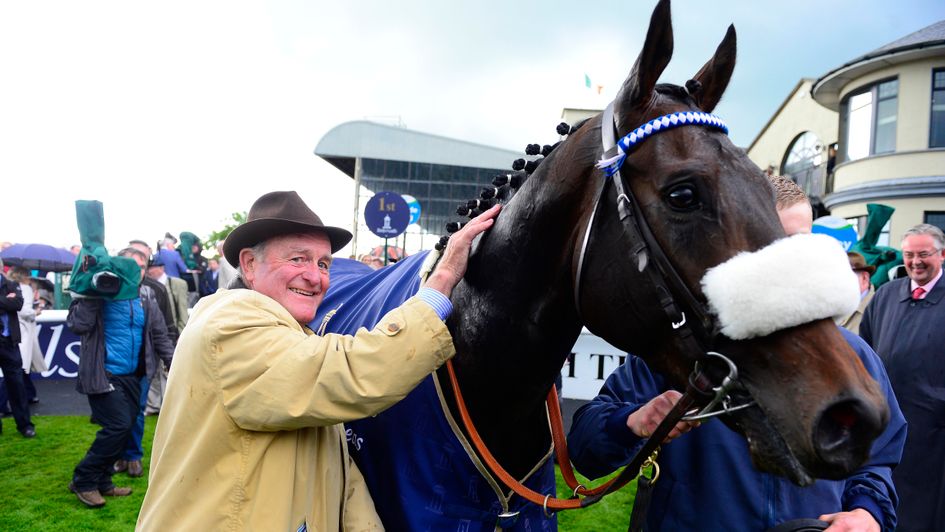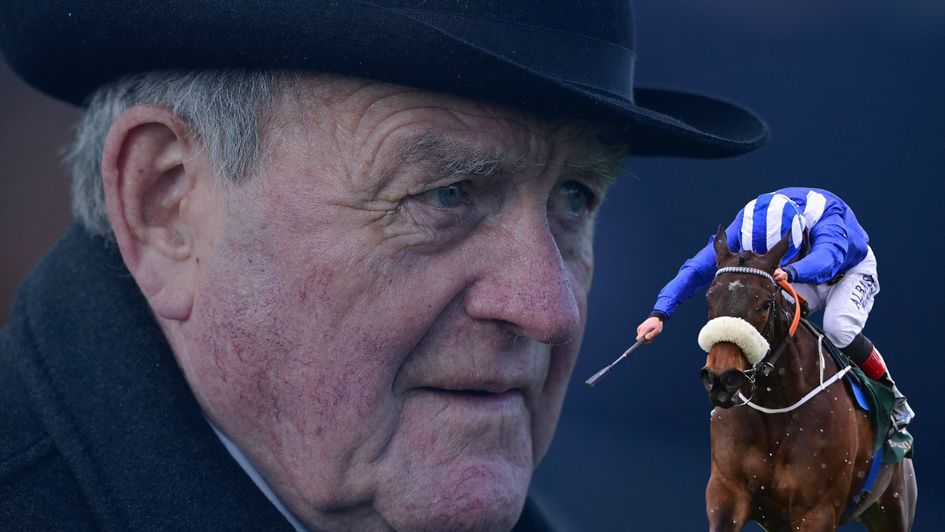Ahead of Mehnah’s Irish 1,000 Guineas bid, John Ingles outlines the huge impact trainer Kevin Prendergast and his father Paddy have had on the sport.
When Joseph O’Brien won his first Classic as a trainer – the 2018 Irish Derby with Latrobe – the next four home were all trained by his father Aidan. It had been a similar story two years earlier when Joseph’s first Group 1 success as a trainer came in the Moyglare Stud Stakes in which Intricately was chased home by a pair of Ballydoyle fillies. The father-and-son rivalry has even been played out on the other side of the world as on both occasions that Joseph has won the Melbourne Cup, with Rekindling and Twilight Payment, his father saddled the runner-up.
Between them, the three O’Briens – Joseph’s brother Donnacha took out his licence in 2020 – were responsible for the first four home in last year’s Irish 1000 Guineas in which Aidan came out on top with Peaceful. Donnacha was therefore denied his first Classic success as a trainer with runner-up Fancy Blue, though the tables were turned when the two fillies met again in the Prix de Diane in which Fancy Blue had Peaceful back in third.
But this isn’t the first time that fathers and sons in the Irish training ranks have gone head-to-head in the Classics. In fact, they’re not even the first pair of O’Briens to do so. The thrilling finish to the 1984 Derby resulted in a short-head victory for the David O’Brien-trained Secreto over the previously unbeaten odds-on favourite El Gran Senor trained by his father Vincent.
With both Aidan and Joseph O’Brien likely to be represented in next weekend’s two Irish Guineas, it’s not out of the question that both father and son will each come away with another Classic winner. Again, that wouldn’t be an unprecedented event as Paddy and Kevin Prendergast accomplished that feat on two occasions in the 1970s.
In 1972, father Paddy won the 2000 with 33/1 outsider Ballymore, remarkably making his racecourse debut, while son Kevin registered the first Classic winner of his training career in the 1000 with Pidget whose success was also a surprise as she upset the Vincent O’Brien-trained favourite Arkadina at odds of 20/1. Pidget went on to be beaten in the Oaks, both at Epsom and the Curragh, but completed a unique Classic double later in the year by also winning the Irish St Leger.
Four years later, it was Prendergast senior who won the Irish 1000 Guineas, with Sarah Siddons whose Yorkshire Oaks victory later that season was one of four at the Ebor meeting for her trainer who had a particularly good record at that fixture over the years. Meanwhile, Kevin Prendergast won his first Irish 2000 Guineas the same year with 33/1 outsider Northern Treasure.
Paddy Prendergast won the Irish 2000 Guineas for a fourth time with Nikoli in 1980, a colt who turned out to be the last of a total of 17 Classic winners for his trainer during an illustrious career that had begun in the 1940s. Nikoli’s essay in Racehorses of 1980 describes Prendergast as ‘one of the great trainers of the post-war era and a notably colourful character’ and goes on to describe how his training career began:
‘His success story had an undistinguished start: after serving his apprenticeship at the Curragh, he came to England to ride over hurdles, then tried his luck in Australia. On the outbreak of war he was back in Ireland where he clubbed together with three friends and paid £150 for a sprinter called Pelorus. Cleverly placed, Pelorus won a hatful of races and it was on this horse’s success that the Prendergast empire was built. Before long Prendergast was embarking on ambitious raids on the best English prizes with top-class two-year-olds such as Windy City, The Pie King and Sixpence. There was hardly a major race in England and Ireland that he didn’t win in his career.’
Indeed, Paddy Prendergast’s Classic successes weren’t confined to Ireland. He was the first Irish trainer to win the 2000 Guineas, with Martial in 1960, and was at the forefront of Ireland’s rise as an international racing nation. Vincent O’Brien wasn’t champion Flat trainer in Britain until 1966, only after Prendergast had preceded him as the first foreign trainer to win the title, doing so for three years in succession from 1963 to 1965. As well as winning the Oaks in 1963 with Noblesse, Prendergast won the same year’s King George VI & Queen Elizabeth Stakes and St Leger with Ragusa (who later sired Ballymore), while 1000 Guineas winner Pourparler helped him retain his title in 1964. The last of Prendergast’s four Irish Derby winners Meadow Court, part-owned by Bing Crosby, won his trainer a second King George in 1965 when he was champion in Britain for the third and final time.
The only Classic in England and Ireland to elude Paddy Prendergast was the Derby – Meadow Court came up against the outstanding French colt Sea-Bird at Epsom. However, following his Irish 2000 Guineas victory in 1980, Nikoli was favourite to complete the full set of classics for his trainer who by then was gravely ill. But Nikoli disappointed at Epsom and his trainer sadly passed away just weeks later on the Thursday of Royal Ascot.
Later that season, Kevin Prendergast won the Moyglare Stud Stakes with Arctique Royale, a filly bred by his father (as was her relative, the top-class stayer Ardross), and in 1981 she became her trainer’s second Irish 1000 Guineas winner after Pidget. Incidentally, Kevin Prendergast’s nephew Patrick became the third Prendergast to win the Moyglare when successful with Skitter Scatter in 2018.
Pidget’s subsequent Irish St Leger victory was the first of Kevin Prendergast’s four victories in the race, with two of those wins provided by Oscar Schindler in the 1990s. Like his father, Kevin Prendergast has enjoyed Classic success in Britain, winning the 1977 2000 Guineas with Nebbiolo.
But it was to be fully 40 years after first winning the Irish 2000 Guineas that Prendergast won it for a second time when Awtaad, taking his trainer’s tally of Classic winners in Britain and Ireland to nine, got the better of Newmarket winner Galileo Gold in 2016. Awtaad was owned by the late Sheikh Hamdan Al Maktoum, a loyal supporter of Prendergast for more than 30 years. Without that support, Prendergast admits he wouldn’t have been able to remain in business.

Prendergast also trained both the dam and grandam of Awtaad – Asheerah and Adaala were useful fillies in their own right, the latter successful at listed level – and several other family members besides. The same family came up trumps again with another Classic contender just three years after Awtaad with Madhmoon, another grandson of Adaala. He took his chance in the 2000 Guineas at Newmarket rather than at the Curragh, finishing fourth, and fared better still at Epsom, going down by just half a length to Anthony Van Dyke in a Derby where the other five colts in the first six were all trained by Aidan O’Brien.
Since Awtaad, who was her first foal, Asheerah has been the source of further winners for Prendergast. Her five-year-old son Alhaazm completed a four-timer in handicaps at Dundalk last month, while her useful daughters Aneen and Alghabrah have both represented the stable in the Irish 1000 Guineas in recent years. Both managed to beat only one home in their attempts but better can be expected from Asheerah’s current three-year-old filly MEHNAH who goes for the same race next weekend, 40 years after Prendergast last won the Irish 1000 Guineas with Arctique Royale.
Mehnah made a successful debut at Dundalk last year and looked most unlucky not to make a winning reappearance when failing by just a head to catch Keeper of Time, the 80/1 winner of last month’s 1000 Guineas Trial at Leopardstown. Further back in the field, incidentally, were no fewer than eight fillies trained by one or other of the O’Briens.
Prendergast could also be represented by another Shadwell-owned runner, Monaasib, in the Irish 2000 Guineas, a colt who has been placed behind High Definition and Poetic Flare in his last couple of starts.
After the latter won the 2000 Guineas at Newmarket, much was made of the age of his trainer Jim Bolger, though even he has to bow to Prendergast, who began training in 1963 after assisting his father, in terms of seniority.







